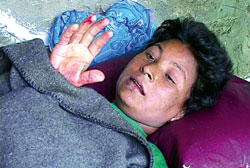|
|
"Sushila Jaisi's case is complicated. Send one person to hospital to keep watch. Journalists shouldn't find out about it." This order was overheard being given by the then police chief of Accham, Dhanbahadur Chand, over the police radio. A few journalists, including myself, headed to the Accham hospital. "She's in hospital because her genitals and uterus are infected due to an unsuccessful abortion attempt. Her condition is very serious," the doctor on duty Arjun Sapkota explained. We had to find out why the police wanted to keep Sushila's case under wraps. No one knew at the hospital, but the police started following her case when they found out that her husband had been living in India for three years and that it was another man's child.
Sushila lay in the hospital bed, delirious, saying only, "Nothing has happened to me. I don't want to say anything." A source claimed that Sushila's pregnancy was the result of rape by a Jwaladal Battalion soldier. Meanwhile, a team of doctors from the Centre for Victims of Torture arrived in Mangalsen from Nepalganj to treat a Maoist-torture victim. Dr Sapkota told us that Sushila needed better care immediately, possibly in Nepalganj. A CVICT doctor told us that if she could be transported to Nepalganj, his organisation would pay for her medical costs. We visited Sushila together and after the doctor said he was from Kathmandu, a reassured Sushila told us this: "I was raped by Dane Mahar, a soldier, who pressured me to abort after he found I had conceived." CVICT returned to Chalsa, and we faxed the news of Sushila's rape to Kathmandu.
Shortly after, I misplaced my notebook in a shop. Someone found it and turned it over to the army, who called me promptly that evening to ask me to not talk about the rape. They threatened me with unimaginable consequences if the news were published. The news was published. I was warned in the middle of the marketplace by Major Bishnu Hari Baniya, "Now be prepared to face your punishment." Sushila's situation did not improve. The doctors said she had bled too much and the hospital in Accham couldn't treat her. No one in her family could make the trip to Nepalganj, which required either an army helicopter or the Accham Red Cross ambulance. The army refused to fly Sushila out, and it was late by the time she was put on the ambulance. The ambulance couldn't make it to Nepalganj due to flooding. Sushila had to go home. A few days later, a student from her village told us of her death. If the army had agreed to fly her to Nepalganj, she would have lived. Her death was unnatural but the army made it natural. The rapist even confessed and asked for forgiveness saying, "Because of me the whole army got a bad name. I made a mistake." The army wanted to save the rapist instead of saving Sushila. Even worse, no human rights or women's rights activist in Kathmandu even considered helping the Jaisi family get justice.



